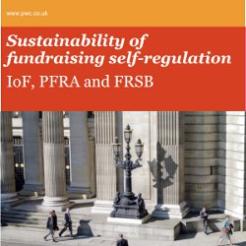In future the Public Fundraising Regulatory Association could be run as an arm of the Institute of Fundraising, a review of fundraising self-regulation has recommended.
The review, carried out by the professional services firm PwC, has concluded that "no immediate significant structural change" would be beneficial to self-regulation or the sector as a whole.
But it says that "in the future, it may be considered to be more efficient to run the PFRA as a department or subsidiary of the IoF”.
It also recommends removing the word "regulatory" from the PFRA name, and recommends a change of the governance structure to reduce the number of commercial agencies on the board.
The report also recommends a review of the financing model of the bodies to meet future requirements, which will include sharing back office functions and potentially a shared office.
The report makes a number of other recommendations for the three self-regulatory bodies, the PFRA, the IoF and the Fundraising Standards Board, to simplify their roles and responsibilities, and communicate a unified strategy to the public.
The three bodies, with funding from the Office for Civil Society, commissioned PwC to carry out the review of their governance, roles and responsibilities last summer.
A summary report and list of the recommendations made by PwC has been published today.
The full report is not being made available outside the three bodies.
The report says: “The individual activities of the IoF and the FRSB would remain largely unchanged, with the role of the PFRA evolving over the next three years to be more monitoring/compliance focused (but only on topics agreed by the three organisations) and becoming more aligned to the IoF to enable it to be sufficiently flexible to respond to the new ‘hot topics’ in the sector.”
Public confusion over who is the regulator?
Peter Hills-Jones, the PFRA’s head of policy and communications, told Civil Society News: “One of the issues around public perception of self-regulation is who the regulator is. We’re the Public Fundraising Regulatory Association and there is the Fundraising Standards Board.
“Historically being a regulatory association helped build a relationship with local authorities to reinforce that we have teeth. That is less of an issue now.
“If it meant dropping the ‘regulatory’ bit from our title we would be happy to look at that. We are working more closely with the IoF to be more sector facing, to drive standards and position charities to take the lead.
“On the other hand the FRSB is the public facing complaints body for every type of fundraising and for adjudications. Last year we agreed we would no long do any public complaints and we have passed about 14 to the FRSB since then.”
In terms of governance, Hills-Jones said there was a perception that the PFRA’s board had too many commercial agency members. The number has now been reduced from six to five with the extra space going to the IoF.
Last June, in its report on charity regulation, the Public Administration Select Committee warned the fundraising bodies that they were “on notice” and had until 2017 to improve self-regulation or face statutory regulation.
It came after Lord Hodgson’s Review of the Charities Act 2006, published in July 2012, criticised the “confused self-regulatory landscape” of fundraising self-regulation.
In response the three bodies have already agreed a division of their responsibilities.
'A shared vision' for self-regulation
Today’s PwC report recommends that the three bodies should now work together to agree and implement a joint strategy, which agrees a "shared vision" for self-regulation.
Peter Lewis, chief executive of the IoF, who will now sit on the PFRA’s board, said: “The shared strategy is going to be really important. The three of us sharing a strategy around self-regulation has not existed since I’ve been at the IoF.
“The Institute gave birth to the FRSB and the PFRA. We should have had a joint strategy about how we take forward self-regulation.”
Lewis welcomed the idea of a shared office, which he called a “self-regulation hub”, once the bodies’ leases come up for renewal.
The Institute’s standards board, which will have members from the FRSB and PRFA, will be “the central thing that binds us together”, he said, responding to issues raised by the PFRA about face-to-face fundraising and by members of the public from the FRSB.
Lewis said the Institute is carrying out a governance review that will consider the recommendation to have an independent chair of the standards committee. Such a person would need to have both charity sector and regulation experience, he added.









